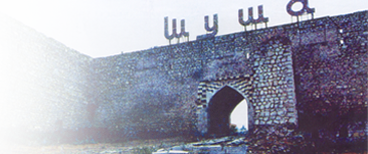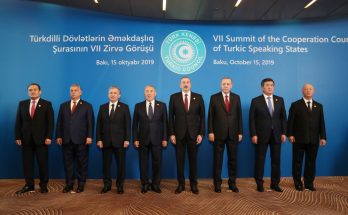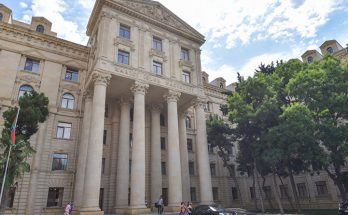 Interview by H.E. Mr. Nicolae Ureche, Ambassador of Romania, NATO Contact Point Embassy in Azerbaijan
Interview by H.E. Mr. Nicolae Ureche, Ambassador of Romania, NATO Contact Point Embassy in Azerbaijan
– Romanian Embassy has fulfilled the duties of NATO Contact Point Embassy (CPE) in Azerbaijan in 2009, as the first year of its mandate. What was the direction of your activity in this field?
– Many simply do not know that NATO does not have embassies accredited in any of the countries of the world. Nevertheless, as NATO activities multiplied along the years, the necessity to support its activity appeared to be more and more stringent. So, a network of Contact Point Embassies appeared in 1992, meant to support the Euro-Atlantic Partnership Council. Contact Point Embassies should not be perceived as formal NATO diplomatic missions in the host countries. They are only one of the channels through which NATO policy and NATO Public Diplomacy activities are promoted in Partner countries. Also, NATO Contact Point Embassies offer advice to NATO Headquarters on various project proposals and on other NATO related issues within the host country. In its CPE capacity, the Romanian Embassy in Baku took in 2009 an active role in presenting NATO’s policies in Azerbaijan. With this aim, the Embassy has organized or supported a significant number of public diplomacy activities and, at the same time, has acted as an important and reliable partner to the Azerbaijani institutions and non-governmental organizations interested in NATO related issues.
– As NATO Contact Point Embassy (CPE) in Azerbaijan, what will be your activity this year? Is Romania planning to fulfill the duties of Contact Point Embassy in 2011 also, or what country will take this position?
– I consider that a great task for our Embassy, as NATO CPE, is to help people understanding the role of NATO in the current security environment. Disseminating information about NATO to the public as a whole is not an easy job, as one has to deal with a wide range of people, some who know already a lot about this organization and others who simply heard something about it, but really have no idea about its role and the way it works. In our capacity of CPE, we intend to target not only the political elite, but the simple citizens in this country as well. I believe that journalists, public and universities, libraries and even businessmen in this country can do a great work by making NATO better known and understood. Beyond that, we are supposed to give logistical support during the visits of NATO officials in Azerbaijan, to arrange programs and meetings, to organize conferences and seminars, political discussions and debates. In fulfilling these tasks, we also count on the full support of the Azerbaijani authorities and on the help of all NATO countries Embassies’ represented in Baku. The decision about a CPE mandate is made by consensus at NATO HQ, based on the individual request of the member states.
– How do you estimate the current level of Azerbaijan-NATO relations? Is it possible to estimate it as a step towards membership?
– Azerbaijan acts as a credible and committed partner of the Alliance. A constant effort to implement the IPAP commitments is visible each year. The political dialogue with the Alliance, covering a wide range of issues is taking place frequently. Of great importance is the support of Azerbaijan for the NATO operation in Afghanistan, as part of its contribution to the antiterrorist war. As a result of significant efforts, good results can be noticed in 2009 in the area of public information, notably an increase of the interest of the Azerbaijani public in NATO related issues, especially in the Alliance role in preserving regional stability and Euro-Atlantic security, promoting democratic values and economic welfare. As CPE, we use each and every opportunity to emphasize the continuous support of NATO for the territorial integrity, independence and sovereignty of Azerbaijan and for the peaceful resolution of the Nagorno-Karabakh conflict. These principles are mentioned in all relevant NATO documents, the last important one being the Declaration of NATO heads of state and government adopted at the Strasbourg-Kehl Summit. According to the statement of the NATO Secretary General, Azerbaijan is an important Partner of the Alliance. I personally believe that NATO Secretary General is totally right.
– In Azerbaijan, public opinion use to associate NATO with a militarist block to oppose the Soviet Union during the Cold War. Romania, also being part of the socialist block for some time, had the same syndrome? How did you escape this syndrome? Could you share the experience in this matter with Azerbaijan also?
– One of the main tasks of CPE is to inform public opinion in the host country about the real nature of NATO, which is a political- military alliance with a strong defensive character. I think that most of the Azerbaijani people do not share anymore the old image and perception on NATO. As much as Romania is concerned, the main aim of NATO’s membership was to ensure the national security and to share the general democratic principles and values of the Euro-Atlantic community. Because of that, the huge majority of the Romanian public opinion supported the target of NATO membership. A remarkable public support for NATO membership and for the required reforms was recorded. All political forces of the country gave their support for NATO membership, which became a real national strategic target. Romania’s accession to NATO is a real national success and an example of national solidarity.
– How long was necessary to Romania, a former member of Warsaw Pact, to reach the NATO membership? Which are the criteria of NATO membership?
– The way to NATO accession was long and difficult for Romania, taking into account the heritage of the communist regime. To have a chronology of the events, I can mention that Romania made the first decisions aimed at achieving NATO membership right after the 1989 revolution: in 1994 it became a member of Partnership for Peace and in 2004 it became a full member of NATO. So, NATO integration has represented a constant goal of Romania for 14 years. Romania’s accession to NATO was a complex process that comprised all fields of political, economic, military and social reforms.
– How do you see the perspectives of sharing the Romanian experience of NATO membership with Azerbaijan?
Romania and Azerbaijan have mutual interest to develop relations in all fields. Our interest was proved from the very initial stage, Bucharest being the second (after Ankara) to recognize the independence of the Republic of Azerbaijan. Since then a long series of political contacts at all levels, consolidated the excellent political relations between our countries. The constant dialogue of the Presidents of our countries pushed up the bilateral cooperation. Given the recent developments in the region, Romania is determined to further consolidate its natural links with the states in Caucasus. Romania was and will be a reliable partner, always willing to intensify our political contacts with Azerbaijan at all levels and to further develop our collaboration within the international organizations. Romania has applied to assume the role of NATO Contact Point Embassy with the strong commitment to support Azerbaijan’s efforts to strengthen its relations with this Alliance. Of course, Romania is ready to share with Azerbaijan the experience achieved on the road to NATO membership.
– How do you evaluate the implementation of Individual Partnership Action Plan (IPAP) by Azerbaijan?
– Azerbaijan has completed its first IPAP cycle and is currently in the final stage of implementing the second one. By an executive order of the President of the Republic of Azerbaijan, was created an Inter-ministerial Commission, composed of the representatives of various Ministries responsible for the IPAP implementation, with the task to identify the necessary resources in this regard. This decree had a positive impact and, as a result, the IPAP activities have considerably increased since its adoption. As CPE, Romania is supporting the full implementation of IPAP by Azerbaijan. In my opinion, Azerbaijan’s co-operation with NATO proved its readiness to further deepen and expand these relations in the fields of mutual interest. In that regard, the achieving of objectives proposed within Individual Partnership Action Plan will contribute to the strengthening of co-operation with NATO in a short and long-term perspective.
– How do you evaluate the influence of the reforms in defense and security fields on NATO membership process? How do you think Azerbaijan achieved this?
– The IPAP document, adopted by Azerbaijan and NATO, contains important commitments in political and security areas, including the defence and security sector reform. Promoting further reforms in defense and security sectors should help Azerbaijan to ensure better its security by allocating necessary resources and improving interoperability of Azerbaijani Armed Forces. These are powerful instruments able to meet the main NATO membership requirements at military level. There should be also taken policy-oriented measures in order to reform the political, social and economic systems.
– Could you tell us something on NATO strategy on South Caucasus and Central Asia?
– Hardly we can talk about a strategy of NATO on South Caucasus and Central Asia, but it is obviously that these regions are important for the Alliance because of their geo-strategic location and for their contribution to the energy security of the world. NATO builds its relationship with the states of South Caucasus and Central Asia individually, but it takes also into account the interlocking interests of others regional actors. Therefore NATO is heavily involved in the South Caucasus and Central Asia and this involvement takes several forms. Most importantly, NATO has several forms of partnership with those countries to assist their armed forces to develop in a manner consistent with democratic governance. Moreover, it was appointed a Special Representative of the NATO Secretary General for Caucasus and Central Asia (Robert F.Simmons) and a NATO Liaison Officer in the Caucasus, dealing with political affars and security in the region.
– It is NATO ready for a new enlargement?
Romania constantly advocated for an “open door” policy, for strengthening the relationships of NATO with all its partners. Romania has firmly supported the necessity of further enlargement of the Alliance in the Western Balkans and in the wider Black Sea area, as the only way to ensure, on a long term basis, the collective defense and stability in Europe and beyond. Romania uses the good relations with its neighbors to strengthen and project stability across NATO’s borders. The Balkans is, for instance, an area we would like to see integrated as soon as possible into European and Atlantic structures. Romania is committed, as well, to the strengthening of NATO’s cooperation with partners in the East, such as the Republic of Moldova, the Ukraine, Russia, and, across the Black Sea, with the nations in South Caucasus and Central Asia. These relations are extremely important for NATO and Romania wants to bring its contribution to their development.
– The realities show that Eastern Europe is dependent of Russia in energy sphere. To get rid of such dependence a lot of projects (Nabucco for example) are prepared. Is it possible NATO’s involvement in energy security? Does NATO have a particular interest for the energy security in Caspian region?
– For NATO there are no doubts that secure delivery of energy resources from the Caspian Sea to international markets is an important element of Azerbaijan’s foreign and economic policy. Azerbaijan could contribute further to the European energy security through its support for the construction of multiple oil and gas pipelines infrastructure linking the Caspian region with Europe. The Memorandum of Understanding on Energy Security, signed by Azerbaijan with the European Union represents the recognition of Azerbaijan’s role in the sphere of energy. Further progress on this trend would clearly have positive effects both for the Azerbaijan and NATO member states, which all have an interest in seeing the South Caucasus region a stable transit route for energy resources and a bulwark against drug smuggling and extremist organizations.
I have to add that Romania has encouraged the inclusion of energy security as a clear-cut topic on the NATO agenda. This is a dimension in which NATO has the capacity to contribute to an increased security and stability in our region. The Bucharest NATO Summit confirmed that energy security is an area of interest for Allies and we intend to continue to build upon these results.
APA




